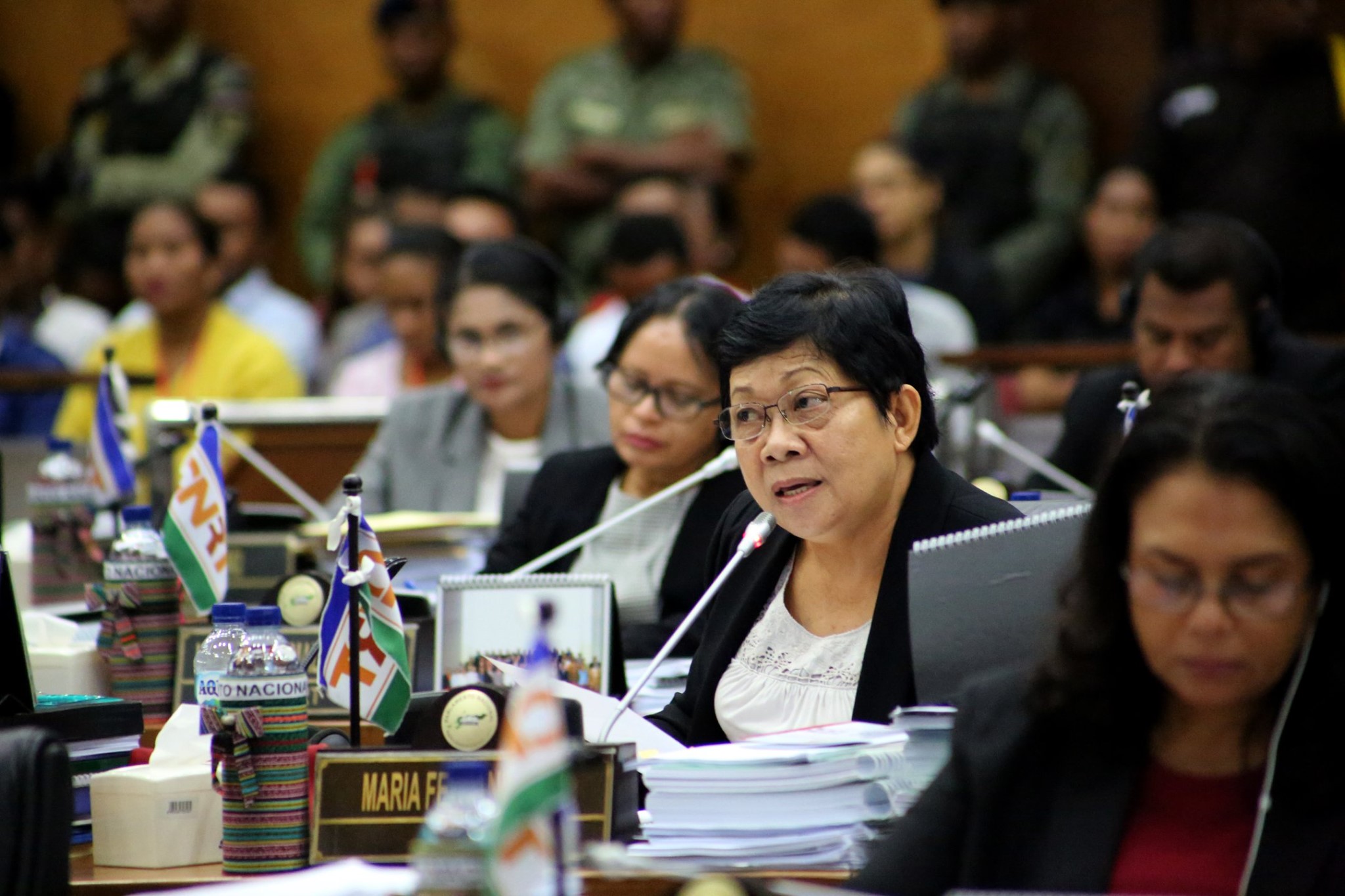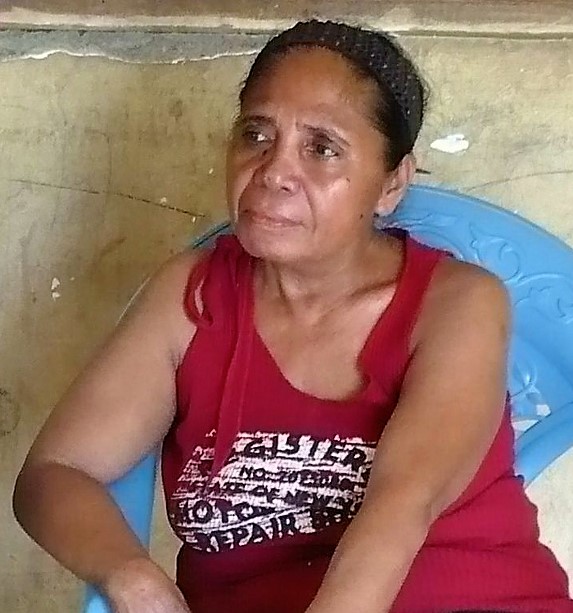|
Maria Fernanda Lay
Maria Fernanda Lay (born 1954) is a politician in East Timor. She has been a member of the National Parliament of East Timor since 2007. In 2023, she was elected as president of the National Parliament, becoming the first woman to lead the body. Early life and education Maria Fernanda Lay was born in 1954 in Baucau, East Timor. She holds a bachelor's degree from a telecommunications school in Bandung, Indonesia. Career While Indonesia still occupied East Timor, Lay worked as a manager at Timor Telecom. She later worked as a project manager for the U.S. Agency for International Development. Lay subsequently pursued a political career as a member of the National Congress for Timorese Reconstruction (CNRT) party. She first gained a seat in the National Parliament of East Timor in the 2007 elections, taking office on August 6, 2007. In her time in Parliament, she has served in leadership roles on various commissions. Since 2010, she has served as secretary of her national grou ... [...More Info...] [...Related Items...] OR: [Wikipedia] [Google] [Baidu] |
Baucau
Baucau ( pt, Baucau, tet, Baukau) is the second-largest city in East Timor, after Dili, the capital, which lies to its west. Baucau has about 16,000 inhabitants, and is the capital of Baucau municipality, located in the eastern part of the country. In the times of Portuguese Timor, Baucau was little more than an overgrown village, and for part of those times was called ''Vila Salazar'', after the Portuguese dictator António de Oliveira Salazar. Geography The administrative post of Baucau is divided into 11 villages ( ''sucos'') * Suco Bahú * Suco Bucoli * Suco Buibau * Suco Buruma * Suco Caibada Uaimua * Suco Samalari * Suco Seiçal * Suco Tirilolo * Suco Triloka * Suco Gariuai * Suco Uailili Infrastructure Much of the infrastructure of the city and the surrounding area was damaged or destroyed by pro-Indonesian militia during the violence that followed the referendum for independence in 1999. Nevertheless, in the old part of Baucau there survive a few r ... [...More Info...] [...Related Items...] OR: [Wikipedia] [Google] [Baidu] |
Olinda Guterres
Olinda Guterres (born 1955) is a politician in East Timor. She has been a member of the National Parliament (East Timor), National Parliament for the Kmanek Haburas Unidade Nasional Timor Oan, KHUNTO party since 2017. Early life and education Olinda Guterres was born in the Baucau Municipality town of Uato-Missa in 1955. She holds a bachelor's degree in Portuguese language, Portuguese. Political career Guterres first ran for national office in the 2001 East Timorese parliamentary election, as a member of the Christian Democratic Party (East Timor), Christian Democratic Party (PDC), but she was not elected. For several years she disputed leadership of the PDC with , which culminated in the East Timor Supreme Court of Justice, Supreme Court declaring the Costa-led version of the party the official one in 2005. She ran again in the 2012 East Timorese parliamentary election, this time as a member of the Kmanek Haburas Unidade Nasional Timor Oan (KHUNTO) party, but the new party ... [...More Info...] [...Related Items...] OR: [Wikipedia] [Google] [Baidu] |
Members Of The National Parliament (East Timor)
Member may refer to: * Military jury, referred to as "Members" in military jargon * Element (mathematics), an object that belongs to a mathematical set * In object-oriented programming, a member of a class ** Field (computer science), entries in a database ** Member variable, a variable that is associated with a specific object * Limb (anatomy), an appendage of the human or animal body ** Euphemism for penis * Structural component of a truss, connected by nodes * User (computing), a person making use of a computing service, especially on the Internet * Member (geology), a component of a geological formation * Member of parliament * The Members, a British punk rock band * Meronymy, a semantic relationship in linguistics * Church membership, belonging to a local Christian congregation, a Christian denomination and the universal Church * Member, a participant in a club or learned society A learned society (; also learned academy, scholarly society, or academic association) is a ... [...More Info...] [...Related Items...] OR: [Wikipedia] [Google] [Baidu] |
East Timorese Women In Politics
East or Orient is one of the four cardinal directions or points of the compass. It is the opposite direction from west and is the direction from which the Sun rises on the Earth. Etymology As in other languages, the word is formed from the fact that east is the direction where the Sun rises: ''east'' comes from Middle English ''est'', from Old English ''ēast'', which itself comes from the Proto-Germanic *''aus-to-'' or *''austra-'' "east, toward the sunrise", from Proto-Indo-European *aus- "to shine," or "dawn", cognate with Old High German ''*ōstar'' "to the east", Latin ''aurora'' 'dawn', and Greek ''ēōs'' 'dawn, east'. Examples of the same formation in other languages include Latin oriens 'east, sunrise' from orior 'to rise, to originate', Greek ανατολή anatolé 'east' from ἀνατέλλω 'to rise' and Hebrew מִזְרָח mizraḥ 'east' from זָרַח zaraḥ 'to rise, to shine'. ''Ēostre'', a Germanic goddess of dawn, might have been a personification ... [...More Info...] [...Related Items...] OR: [Wikipedia] [Google] [Baidu] |
People From Baucau District
A person ( : people) is a being that has certain capacities or attributes such as reason, morality, consciousness or self-consciousness, and being a part of a culturally established form of social relations such as kinship, ownership of property, or legal responsibility. The defining features of personhood and, consequently, what makes a person count as a person, differ widely among cultures and contexts. In addition to the question of personhood, of what makes a being count as a person to begin with, there are further questions about personal identity and self: both about what makes any particular person that particular person instead of another, and about what makes a person at one time the same person as they were or will be at another time despite any intervening changes. The plural form "people" is often used to refer to an entire nation or ethnic group (as in "a people"), and this was the original meaning of the word; it subsequently acquired its use as a plural form of per ... [...More Info...] [...Related Items...] OR: [Wikipedia] [Google] [Baidu] |
Living People
Related categories * :Year of birth missing (living people) / :Year of birth unknown * :Date of birth missing (living people) / :Date of birth unknown * :Place of birth missing (living people) / :Place of birth unknown * :Year of death missing / :Year of death unknown * :Date of death missing / :Date of death unknown * :Place of death missing / :Place of death unknown * :Missing middle or first names See also * :Dead people * :Template:L, which generates this category or death years, and birth year and sort keys. : {{DEFAULTSORT:Living people 21st-century people People by status ... [...More Info...] [...Related Items...] OR: [Wikipedia] [Google] [Baidu] |
President Of East Timor
The president of the Democratic Republic of Timor Leste ( pt, Presidente da República Democrática de Timor-Leste; tet, Prezidente Republika Demokratika Timor-Leste) is the head of state of the Democratic Republic of Timor Leste. The executive powers of the president are limited however, the president is also the ''ex officio'' head of the Council of State, able to veto legislation and is the supreme commander of the Timor Leste Defence Force. Key ;''Political parties'' * * * ;''Other factions'' * ;''Symbols'' * † Assassinated Presidents of East Timor during War for Independence Presidents of the Democratic Republic of Timor-Leste Latest election See also * East Timor ** Politics of East Timor ** List of colonial governors of Portuguese Timor ** Prime Minister of East Timor * First Lady of East Timor * Lists of office-holders Notes References {{Southeast Asian leaders 1975 establishments in East Timor 2002 establishments in East Timor Presidents ... [...More Info...] [...Related Items...] OR: [Wikipedia] [Google] [Baidu] |
Languages Of East Timor
The languages of East Timor include both Austronesian and Papuan languages. (See Timor–Flores languages and Timor–Alor–Pantar languages.) The lingua franca and national language of East Timor is Tetum, an Austronesian language influenced by Portuguese, with which it has equal status as an official language. The language of the Ocussi exclave is Uab Meto (Dawan). Fataluku is a Papuan language widely used in the eastern part of the country (often more so than Tetum). Both Portuguese and Tetum have official recognition under the Constitution of East Timor, as do other indigenous languages, including: Bekais, Bunak, Galoli, Habun, Idalaka, Kawaimina, Kemak, Lovaia, Makalero, Makasae, Mambai, Tokodede and Wetarese. The rise of lingua francas in the linguistically diverse East Timor and the domination of several clans over others have led to the extinction of many smaller languages. However, some of them are still in use as ritual languages or cants. Research done i ... [...More Info...] [...Related Items...] OR: [Wikipedia] [Google] [Baidu] |
Constitution Of East Timor
The Constitution of East Timor entered into force on 20 May 2002, and was the country's first constitution after it gained independence from Portugal in 1975 and from Indonesia, which invaded East Timor on 7 December 1975 and left in 1999 following a UN-sponsored referendum. History The Constitution was drafted by the Constituent Assembly elected for this purpose East Timorese parliamentary election, 2001, in 2001. Pursuant to an UNTAET regulation, the constitution did not need support in a referendum, but entered into force on the day of independence of East Timor after it was approved by the assembly. There are two versions of the Constitution, one in each of the country's official languages, Tetum and Portuguese language, Portuguese. The Constitution consists of seven parts, namely: * I. Fundamental principles * II. Fundamental rights, duties, liberties and guarantees * III. Organisation of political power (including the provisions about the three branches of government) * IV ... [...More Info...] [...Related Items...] OR: [Wikipedia] [Google] [Baidu] |
Tetum Language
, nativename=Tetun , states= Indonesia East Timor , speakers=, mostly in Indonesia , date=2010–2011 , ref=e18 , speakers2=50,000 L2-speakers in Indonesia and East Timor , familycolor=Austronesian , fam2=Malayo-Polynesian , fam3= Central–Eastern , fam4= Timor–Babar , fam5=Tetumic , dia1=Belunese (''Tetun Belu'') , dia2=Terik (''Tetun Terik'') , nation= , minority= (East Nusa Tenggara) , iso2=tet , iso3=tet , glotto=tetu1245 , glottorefname=Tetum , map=Tetum Terik.png , mapcaption=Distribution in East Timor of ''Tetum Belu'' (west) and ''Tetum Terik'' (southeast). The majority of Tetun speakers, who live in West Timor, are not shown. , nativename=''Tetun Dili, Tetun Prasa'' , states=East Timor , speakers= , date=2009 , ref= , speakers2 = L2: in East Timor , familycolor=Austronesian , fam2=Malayo-Polynesian , fam3= Central–Eastern , fam4= Timoric , fam5=Oceanic , fam6=Tetumic , dia1=Belunese (''Tetun Belu'') , dia2=Terik (''Tetun Terik'') , script=Latin ( Tetum alphabet ... [...More Info...] [...Related Items...] OR: [Wikipedia] [Google] [Baidu] |
Portuguese Language
Portuguese ( or, in full, ) is a western Romance language of the Indo-European language family, originating in the Iberian Peninsula of Europe. It is an official language of Portugal, Brazil, Cape Verde, Angola, Mozambique, Guinea-Bissau and São Tomé and Príncipe, while having co-official language status in East Timor, Equatorial Guinea, and Macau. A Portuguese-speaking person or nation is referred to as " Lusophone" (). As the result of expansion during colonial times, a cultural presence of Portuguese speakers is also found around the world. Portuguese is part of the Ibero-Romance group that evolved from several dialects of Vulgar Latin in the medieval Kingdom of Galicia and the County of Portugal, and has kept some Celtic phonology in its lexicon. With approximately 250 million native speakers and 24 million L2 (second language) speakers, Portuguese has approximately 274 million total speakers. It is usually listed as the sixth-most spoken language, the third-most sp ... [...More Info...] [...Related Items...] OR: [Wikipedia] [Google] [Baidu] |



_1938.jpg)


